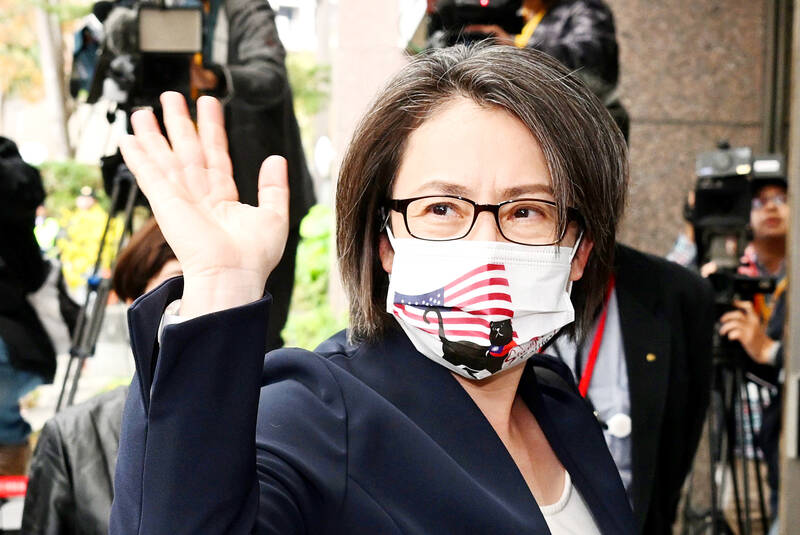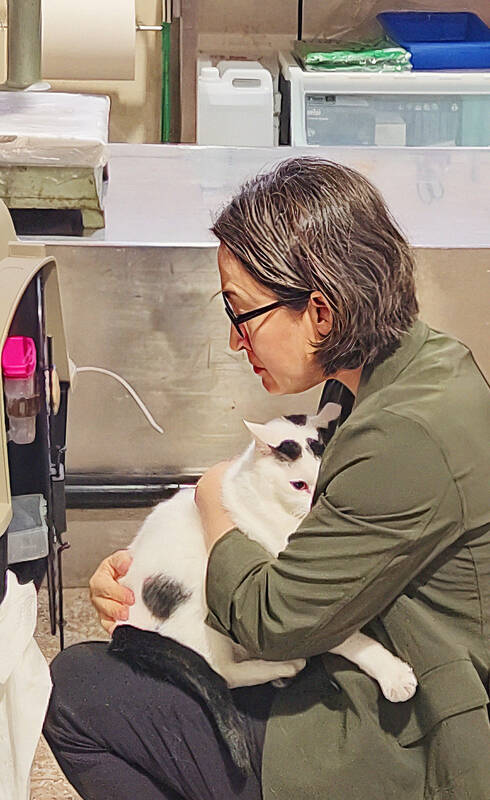The woman hoping to be the next vice-president is a self-proclaimed “cat warrior” who says she will be able to deliver the “global vision” needed to tackle tensions with China.
The ruling Democratic Progressive Party (DPP) hopes that Hsiao Bi-khim (蕭美琴), who until November was the Taiwanese envoy to the US, will be able to convince voters to back the DPP in the high stakes presidential election on Jan. 13.
A political veteran, Hsiao, 52, came up with her own nickname when she was sent to Washington — with her four cats — in 2020.

Photo: Lin Cheng-kung, Taipei Times
The moniker was her response to Beijing’s aggressive “wolf warrior” style diplomacy, which was becoming increasingly combative at that time. Like a cat, Taiwan’s diplomacy would be agile, flexible and comfortable in narrow spaces, she said. The animals are lovable but also independent.
Born in Japan to Taiwanese and American parents, Hsiao’s own life reflects the desire felt by many in Taiwan to forge a distinct Taiwanese identity.
She grew up in Taiwan speaking Mandarin, English and Taiwanese (also called Hoklo). Her family traveled widely; when she was a teenager, they moved to the US where she went on to study political science at Columbia University; she reportedly successfully fought to have a Taiwan stall at the university’s international festival, against the opposition of students from China.

Photo: Yao Kai-shiou, Taipei Times
She chooses to use the Taiwanese version of her given name, rather than the Mandarin version or her English second name, Louise. In the words of her father, who wrote an article about her in 2020: “She wanted a name that would embody her unique background.”
Her identity as a mixed-race woman illustrates the gulf between politics in Taiwan and China. She was Taiwan’s first female envoy to the US and, if elected, would be the second female vice-president.
In Beijing, the Communist party chief Xi Jinping (習近平) last year revealed an all-male politburo, meaning that for the first time since 1997 there are no women in the party’s leadership committee. And the prospect of a mixed-race politician in China is vanishingly remote in a system that emphasizes ethnic purity as central to its idea of nationalism. Some see her as a contrast to the laolunan (老綠男, “old, green, male”) style of politics that has traditionally dominated DPP politics (the party’s color is green).

Photo courtesy of Hsieh Hsi-yang
Hsiao argues that her extensive contacts in Washington on both sides of the aisle will help Taiwan to preserve its status quo — even if that comes at the cost of dialogue with Beijing. China imposed sanctions on Hsiao in 2022 and last year, meaning that she and her family members cannot enter mainland China, Hong Kong or Macau.
PEACE IN THE STRAIT
All three of the main parties are arguing that their candidate can preserve peace and stability for the self-governing island. For the incumbent DPP, that offer to voters comes in the form of a ticket headed by William Lai (賴清德), the current vice-president, and his running mate, Hsiao.
Although the DPP does not formally support a declaration of independence, it is widely seen as the party that would try to put the most distance between Taipei and Beijing. Lai has previously described himself as a “pragmatic worker for Taiwan independence.”
The main opposition party, the Chinese Nationalist Party (KMT), argues that more dialogue, as well as economic and trade links with China, will help reduce cross-Strait tensions. And the relative newcomer, the Taiwan People’s Party (TPP), claims to offer a middle way for voters, although its candidate Ko Wen-je (柯文哲) has supported increased links with China.
Hsiao, however argues that Taiwan needs to bolster its defenses against the “constant pressures” from China. The DPP hopes she will be able to convince the country’s 19.3 million eligible voters it is the party that can boost Taipei’s standing on the world stage.
“She is very international,” says Bonnie Glaser, the managing director and Taiwan expert at the German Marshall Fund, a thinktank. “That is part of what the DPP wants to portray itself as, as a party that is connected to the world.”
Soon after graduating in the US, Hsiao returned to Taiwan to join the DPP, becoming the party’s head of international affairs at the age of 26. In 2002, she renounced her US citizenship in accordance with laws about civil servants.
Before being appointed to serve in Washington in 2020, she was a member of Legislative Yuan, and served for a decade in the east-coast county of Hualien, which has a large Indigenous population — an experience which her supporters say boosts her credentials outside the Taipei elite.
In Monday’s televised vice-presidential debate, Hsiao said that there were three main issues facing Taiwan: the economy, geopolitical uncertainties and global challenges such as climate change.
But the question of how to negotiate the relationship between the US and China is dominating the race. In a recent interview with The Economist, Hsiao summed up her, and the DPP’s, approach: “Cats have the ability to tread softly but firmly … You can’t force them to do things they don’t want to. You don’t command cats. You’ve got to be nice to them, and cats will repay your kindness with warmth.”

April 14 to April 20 In March 1947, Sising Katadrepan urged the government to drop the “high mountain people” (高山族) designation for Indigenous Taiwanese and refer to them as “Taiwan people” (台灣族). He considered the term derogatory, arguing that it made them sound like animals. The Taiwan Provincial Government agreed to stop using the term, stating that Indigenous Taiwanese suffered all sorts of discrimination and oppression under the Japanese and were forced to live in the mountains as outsiders to society. Now, under the new regime, they would be seen as equals, thus they should be henceforth

Last week, the the National Immigration Agency (NIA) told the legislature that more than 10,000 naturalized Taiwanese citizens from the People’s Republic of China (PRC) risked having their citizenship revoked if they failed to provide proof that they had renounced their Chinese household registration within the next three months. Renunciation is required under the Act Governing Relations Between the People of the Taiwan Area and the Mainland Area (臺灣地區與大陸地區人民關係條例), as amended in 2004, though it was only a legal requirement after 2000. Prior to that, it had been only an administrative requirement since the Nationality Act (國籍法) was established in

Three big changes have transformed the landscape of Taiwan’s local patronage factions: Increasing Democratic Progressive Party (DPP) involvement, rising new factions and the Chinese Nationalist Party’s (KMT) significantly weakened control. GREEN FACTIONS It is said that “south of the Zhuoshui River (濁水溪), there is no blue-green divide,” meaning that from Yunlin County south there is no difference between KMT and DPP politicians. This is not always true, but there is more than a grain of truth to it. Traditionally, DPP factions are viewed as national entities, with their primary function to secure plum positions in the party and government. This is not unusual

US President Donald Trump’s bid to take back control of the Panama Canal has put his counterpart Jose Raul Mulino in a difficult position and revived fears in the Central American country that US military bases will return. After Trump vowed to reclaim the interoceanic waterway from Chinese influence, US Defense Secretary Pete Hegseth signed an agreement with the Mulino administration last week for the US to deploy troops in areas adjacent to the canal. For more than two decades, after handing over control of the strategically vital waterway to Panama in 1999 and dismantling the bases that protected it, Washington has